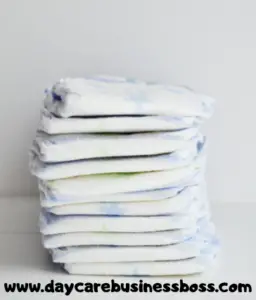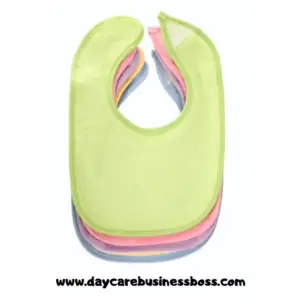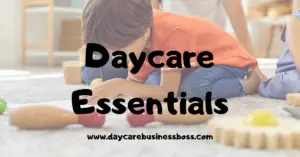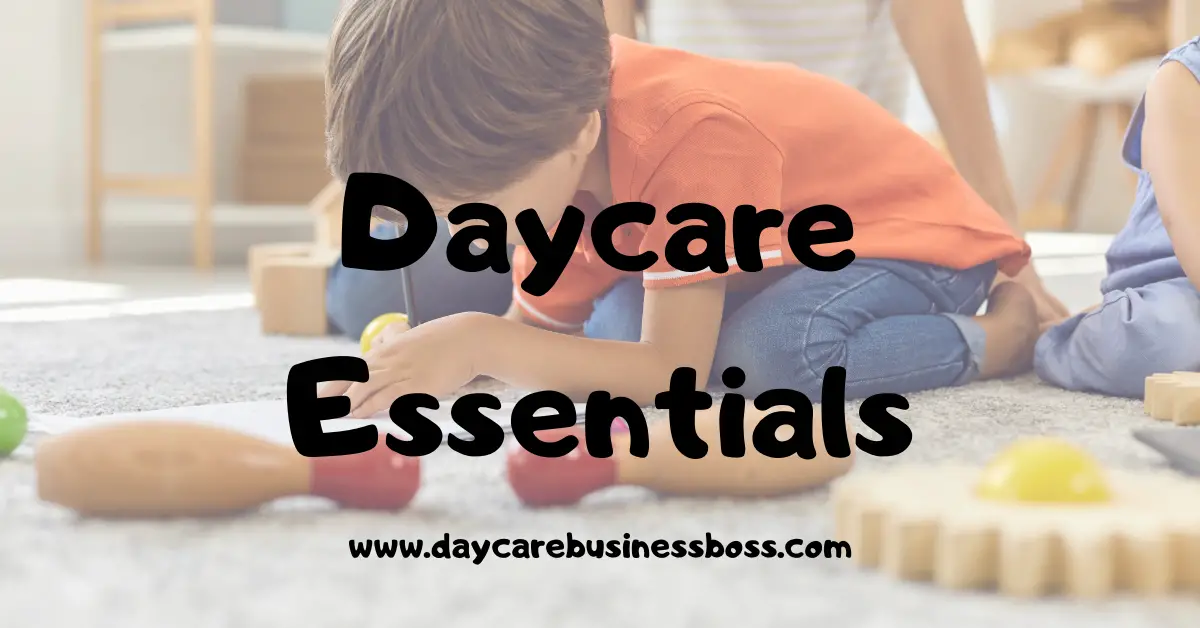As a daycare owner, you and your staff are responsible for taking care of the children in your care. However, you and your staff can’t be expected to handle everything or have everyone’s supplies for every single day. It would make your daycare center unprofitable. It is often necessary to have spare supplies just in case something happens. But you also need to make sure parents are taking their share of the responsibility and sending what their children need.
Items you should tell parents to pack for their children are:
• Diapers and changing supplies
• Assorted comfort items (pacifiers and stuffed animals)
• Food (including formula and finger foods)
• Information (medical or otherwise)
• Bottles, bibs, and sippy cups
• Extra clothes and bedding supplies
Diapers and changing supplies
For this article, we are going to assume you are starting a daycare that is not under the HeadStart federal program that can provide diapers and food to daycares under their banner.
 Regardless of what brand is being used, diapers or Pull-Ups in the case of toddlers going through toilet training are expensive. Babies and toddlers come in all shapes and sizes. It would be nearly impossible for a small startup daycare to provide a consistent supply of diapers in every possible size. Especially since a lot of parents have brands they swear by. Some prefer disposable, others prefer cloth. To keep expenses and arguments to a minimum, you should make sure parents send a week’s worth of diapers every week. While it might be plausible to keep some spares on hand in case of emergency, particularly if you’re running a smaller daycare, you shouldn’t allow parents to expect you to provide diapers or Pull-Ups for them. If you do need to provide emergency diapers, you should charge parents.
Regardless of what brand is being used, diapers or Pull-Ups in the case of toddlers going through toilet training are expensive. Babies and toddlers come in all shapes and sizes. It would be nearly impossible for a small startup daycare to provide a consistent supply of diapers in every possible size. Especially since a lot of parents have brands they swear by. Some prefer disposable, others prefer cloth. To keep expenses and arguments to a minimum, you should make sure parents send a week’s worth of diapers every week. While it might be plausible to keep some spares on hand in case of emergency, particularly if you’re running a smaller daycare, you shouldn’t allow parents to expect you to provide diapers or Pull-Ups for them. If you do need to provide emergency diapers, you should charge parents.
Don’t charge something excessive that will provoke a backlash. Just charge enough to make sure parents start paying attention. And make it clear from the start that emergency diapers will cost extra and call them when their child is running low so they can’t complain.
Other changing supplies like wipes and baby powder are also necessary. They are also expensive to provide for every child. So you have to make sure parents take responsibility. To assist them and your staff, your daycare should have a cubby dedicated to each child where you can put their changing supplies so they can be organized for quick access.
Pacifiers and Comfort Items
Sometimes, the easiest way to quiet a baby is with a pacifier. Some toddlers who are being weaned off of or have grown out of pacifiers may require another comfort item like a stuffed animal or security blanket. It is on the parent to make sure that they send these comfort items if their child needs them. You should advise parents to pack extras of those things. Pacifiers are small and prone to being lost. Babies and toddlers aren’t good at keeping track of their things and daycare workers (and you) can’t always be depended on to keep track of every pacifier so parents should be advised to pack extras and be prepared to replace them.
They should also be ready to replace stuffed animals or security blankets. Though the risk of these items getting lost can be mitigated by parents clearly labeling their child’s things, the risk always remains. You should also advise parents to have their child’s comfort items washed frequently so they don’t become a health hazard to anyone. If your daycare has a laundry service, you could conceivably do it. But be prepared for a potential meltdown if the child gets fussy without their comfort item.
Food
Unless your daycare is operating under the HeadStart banner, chances are you don’t serve food or have a lot of baby formula on hand. If you’re running an in-home daycare, you probably don’t have enough food and cabinet space to store food and bottles for every child, even if you’d like to.
Serving food beyond something simple like Goldfish crackers for every child is also prohibitively expensive without something like the HeadStart program or charging the parents for the food. The latter part can theoretically be done, which requires adhering to health codes, nutritional guidelines, having a stocked kitchen, and kitchen staff. Unless you have the money for all that, you’ll be better off telling parents to pack their own kids’ food.

You may want to give suggestions on what to pack but don’t be pushy unless there’s a major problem. A lot of parents with kids in daycare are new parents and may lack what someone who works with children considers “common sense.” Remember that not everyone had parents that were serious about nutrition.
Parents should have food and formula in clearly labeled containers so it doesn’t get mistaken for another child’s food. Tell parents to keep things in airtight containers and temperature-controlled bags and thermoses. Some parents may want you to keep things refrigerated or to heat things around lunchtime. Since the parent prepared it, you wouldn’t be breaking any laws by doing so. Whether or not you do is up to you. It would be a nice service but it is time-consuming to do for every child.
If you are going nut-free to protect a child with a nut allergy, you should be upfront with parents when they first enroll. If you aren’t going nut-free, you should be upfront about that too so parents can make an informed choice.
More tips on Daycare food HERE
Information
You will probably get basic information when parents first enroll their kids but you’ll need more than phone numbers.
You need to be clear with parents about the fact that you and your staff aren’t mind-readers. If a toddler has a dislike of certain candy flavors, for example, parents need to inform you of that. Others, especially infants, might be on a set schedule in regards to feeding and naps. Parents need to inform you of that so your staff can keep them on that schedule.
They also need to inform you of any medical conditions and any medications they’re taking. These include any allergies, any cold medications, and any other medical conditions that might come up. You should also let parents know if you or your staff see something that might be a matter of medical concern, such as failing to reach certain developmental milestones.
Bottles, bibs, and sippy cups
 Having bottles for every baby in your daycare, and keeping them washed consistently might not be possible for a large daycare. Much like everything else, bottles come in different sizes and you can’t prepare for every eventuality. So you should make sure parents bring bottles for their kids. You should also tell them to bring extra bottles in case their child is extra hungry that day.
Having bottles for every baby in your daycare, and keeping them washed consistently might not be possible for a large daycare. Much like everything else, bottles come in different sizes and you can’t prepare for every eventuality. So you should make sure parents bring bottles for their kids. You should also tell them to bring extra bottles in case their child is extra hungry that day.
Bibs are also is important. Babies and toddlers struggle to feed themselves and babies who are teething often drool on themselves. In short, parents must buy bibs and send them to daycare. If parents want to keep some at the daycare in their child’s cubby, that could be a good option.
When you start noticing that a child is improving their coordination, you could suggest that parents start them on sippy cups (parents will have to supply those too). But bibs will still be needed since toddlers new to feeding themselves will make messes on their clothes.
Extra clothes and crib bedding
Speaking of clothes, parents will need to provide extra outfits. If there’s one thing babies and toddlers do, it’s making messes. Feeding times can go wrong. Diapers can leak. Art projects can make a child’s clothes more colorful. Since you can’t just have children spend an entire day in messy clothes (it would be extremely bad for the reputation of your daycare center if you did), you need to make sure parents leave extra clothes in the child’s bag. This can be important during warm-weather months when you take the kids outside to play. When kids play outside, they will get dirty. Plus, having some extra clothing in case the weather changes can be helpful. There are times when you’ll be expecting rain and not plan on sending the kids out, only for the weather to be good.
Crib or cot bedding will also be important for parents to provide. Accidents commonly happen during naptime. And there will be a limited amount of cribs and cots. Your staff will need to have bedding for each child.
Related Questions
1. What if I can’t get parents to provide the things on the list?
Then you need to politely but firmly tell them that your daycare is not for them. At the end of the day, their child is their responsibility. Unless you’re providing a full-service daycare (and the parents are willing to pay the much higher price), you need to stand firm on this.
2. What are some other examples of information I should share with parents?
You should always share things that could be a medical concern or signs of possible developmental delays. But you should share good information too. If a child seems like they might be gifted at something, let the parents know so they can nurture that gift.

Please note: This blog post is for educational purposes only and does not constitute legal advice. Please consult a legal expert to address your specific needs.
To learn more on how to start your own daycare checkout my startup course and documents here.

Meet Shawn Chun: Entrepreneur and Childcare Business Fan.
I’m a happy individual who happens to be an entrepreneur. I have owned several types of businesses in my life from a coffee shop to an import and export business to an online review business plus a few more and now I create online daycare business resources for those interested in starting new ventures. It’s demanding work but I love it. I do it for those passionate about their business and their goals. That’s why when I meet a childcare business owner, I see myself. I know how hard the struggle is to retain clients, find good employees and keep the business growing all while trying to stay competitive.
That’s why I created Daycare Business Boss: I want to help childcare business owners like you build a thriving business that brings you endless joy and supports your ideal lifestyle.


